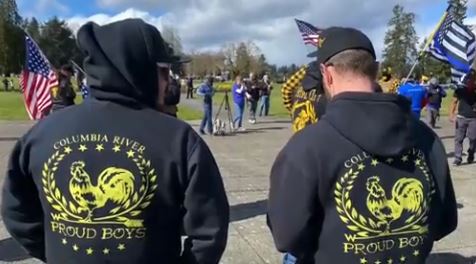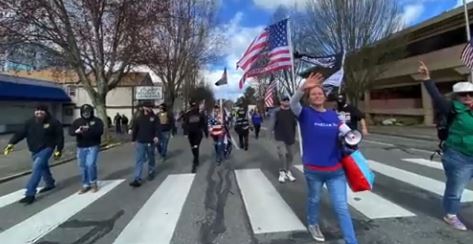By Julia Tong, AsAmNews Intern
The firing of journalist Jonathan Choe from KOMO4 in Seattle is igniting a passionate debate about the role of journalism. The station let Choe go after it determined his coverage of a Proud Boys rally failed to meet its editorial standards. The Southern Poverty Law Center has described the Proud Boys as a far-right White nationalist terrorist organization.
AsAmNews spoke with Choe as well as two experts on media ethics and communications about the controversy.
The veteran reporter live-tweeted a Proud Boys rally in Olympia, Washington in March. In an interview with AsAmNews, he stressed that he attended the event independent of his employer. Though the event was advertised as a “rally for America,” other flyers circulated on Twitter claim that the protesters were advocating for the release of members detained for their participation in the January 6th riots at the U.S. Capitol.
Choe’s dismissal has sparked controversy and conversation about the ethics of his firing. The specific circumstances of his dismissal remain unclear, and Choe himself says he is unable to comment on personnel-related issues.
Dr. Edward Wasserman, a professor and former dean of journalism at the University of California Berkeley who has written extensively on media ethics, said the lack of knowledge about the internal dynamics of the station makes a clear judgment difficult. He further doubts if it is “fair” to hold Choe’s Twitter posts to the same standard as official broadcasts.
“He wasn’t exactly covering the rally. He was commenting on it as a social media post. So editorial standards you’d be held to if you’re doing a video report for his TV station would presumably be different. There would be more hands involved, and there would be some attempt to provide some history and setting and explanation as to who these people are,” Wasserman said.
“This is a posting, a social media posting. And I’d want to know what the station’s policy is with respect to what it allows its employees to do on social media.”
In the situation that the company had lacked clear guidelines, Choe’s firing would be an “abuse of managerial discretion” in violation of due process, believes Wasserman.
However, allegations have surfaced that Choe had previously violated company policy. An email obtained by The Stranger reminded staff members of the company’s policy that prohibits employees from “reposting or retweeting posts on our platforms that do not share our professional standards” without approval. The email was sent days after Choe appeared on the Doni Monson Show, seemingly in violation of this policy.
If this is true, Wasserman says, his concerns about the due process would be moot. However, he also notes that he would “viscerally feel differently about the posting if it came across as promotional posting for what is essentially a right-wing hate group.”
“I don’t think it really got there. It was just kind of bland, placid, and somewhat cliche, full of visual cliches of a kind of flag-waving, ineffectual gathering of people with no real political point or real edge, no real program being advanced. So you know, I didn’t think it was a particularly offensive or particularly effective piece of video,” he said.
However, Dr. Cynthia Wang, who specialized in communications studies at Cal State LA and who wrote the book Communicating Across Differences, reached a different conclusion. By providing “visibility and coverage” to the Proud Boys, Wang says, Choe had given “a group that has been designated as a really problematic group publicity.” She says the imagery Choe focused on in the video—such as American flags, peaceful marchers, and slogans—may prompt varied interpretations within the audience.
“When you make something visible, you give it representation. If Jonathan Choe posted those slogans without context, the audience is going to be left filling in whatever context it wants,” Wang said. She added: “You leave so much of what you film on the cutting room floor. So my question to that is, is that representative? What got left out? And again, what story is he telling?”
Wang further stresses that “context is everything,” maintaining the importance of providing the “highest [level of context] we can possibly have.” However, Choe, she notes, had not provided that context about the Proud Boys in his Twitter thread or thoroughly researched his post’s audio.
Much of the controversy was sparked by a montage Choe made after the rally. The video, which Choe deleted but has been reposted by other users, displays a compilation of images Choe took during the rally, overlaid over a song being sung by the Proud Boys. Twitter users identified the song as “We’ll Have Our Home Again,” which is associated with the alt-right, white supremacist group Mannerbund.
The video was accompanied by the caption: “Proud Boys and other marchers say they will stay on the Capitol campus in Olympia for a few more hours to mingle and answer questions if anyone is interested in learning more about their cause and mission.”
In a Medium post, Choe claimed that the audio was taken directly from his videos of the protest, and that he was creating what was referred to, in TV news terminology, a “NAT Pkg.” “One of my videos picked up music blasting from a speaker strapped over the shoulder of one of the protesters. … Hours later, the critics started pouncing on this final Tweet, accusing me of intentionally creating “white supremacist propaganda,” Choe wrote.
He added: “I wanted to simply capture a moment in time, with authentic visuals and sounds. It was clearly misinterpreted by some on-line.”
Wang disagrees.
“People are responsible and should be responsible for what they post and what they communicate. And if he really didn’t know, then that was kind of irresponsible of him to not do his homework, to not understand the context of the music that he had overlaid,” she said.
Choe says he has heard the feedback he’s received about the mistakes he made while creating the video. He has used the time since his firing to reflect on how to improve his future work.
Choe titled his Medium article “I GOT FIRED(CANCELLED) FOR LIVE TWEETING A PROUD BOYS RALLY,” writing that his intention in covering the rally was nonpolitical and nonideological.
“I wasn’t taking sides. I wasn’t saying anything was good or bad. In fact, none of the marchers would talk to me on the record because they ‘didn’t trust the mainstream media,’” Choe wrote.
“I’ve been a journalist now for more than 20 years. If there was a Ku Klux Klan rally and cross burning at Seattle Center in downtown, I would be the first person there to cover the event. My job is to present all sides, not just the one that aligns with my values or worldview.”
Choe told AsAmNews that he did not intend the video to be broadcast by his employer.
Choe’s tweets were met by fierce criticism online. Speculating about Cho’s firing, Twitter user Erica C. Barnett described Choe’s Tweets as “flattering coverage of a Proud Boys rally that encouraged viewers to “mingle” with the hate group and learn about its mission.” The Daily Kos also published a piece that described Choe’s videos as “thinly disguised promotional material for the [Proud Boys] hate group.”
To others, Choe’s reporting, whether intentionally or not, lacked critical context about the Proud Boys and their politics. As Will James, a reporter for NPR Seattle, tweeted: “Jonathan Choe’s Proud Boys tweets, and subsequent firing, is a lesson. Reporting on extremism as a “both sides” issue without context or forethought is a failure.” The Society of Professional Journalists’s Code of Ethics stipulates that journalists should “provide context” and avoid “oversimplify[ing] in promoting, previewing, or summarizing a story.”
“KOMO did not direct or approve Jonathan Choe’s decision to cover this weekend’s rally, nor did his work meet our editorial standards,” the statement read from the station. “We have decided to end our employment relationship with him effective today.”
Choe says he’s still processing what everyone is saying, including his critics.
“I’m just listening right now,” he said to AsAmNews. “I’ve had some great conversations with some people who’ve given me some interesting suggestions, and those will all be considered in the future.”
At the same time, Choe worries about how his “circumstances” will affect journalism, claiming a “coordinated attempt and effort by alt-Left activists to come after me for my reporting in the past year and a half.”
“This was the opening. [Activists] seized on and they took, again, what I intended to cover fairly and accurately a Proud Boys rally, and they turned it into something that it was not. So my concern is overall for the state of journalism locally here in Seattle,” Choe said, adding: “the concern now is you’ve only got maybe a handful of journalists now doing true accountability journalism. So that’s my main concern. But this could potentially scare off the intimidation tactics used by the alt-Left, and the outrage machine online canceled culture and how that’s going to impact good journalism being done, regardless of worldview or ideology.”
However, as Wang stresses, the concept of “objectivity”—which Choe had also cited in his Medium post—is impossible to achieve: “there’s no such thing as one universal accurate portrayal of events.” She applies this logic to her interpretation of Choe’s dismissal as well.
Ultimately, a “black and white” interpretation of Choe’s actions ignores the numerous dimensions at play, including: Choe’s identity as an Asian American journalist who has faced discrimination in the industry, the internal politics of Choe’s workplace, press freedoms, and other factors.
“My fear with this and with other events that are going on is that this will be reduced to a simple narrative of right or wrong, black or white, good or bad. But I do think that whatever we try to do that we deny the nuances and the context of the situation. And by doing that, I don’t think that we can be well guided.”
She added: “[I don’t think] simplifying things guides us to a more compassionate and humane ethics.”
AsAmNews has Asian America in its heart. We’re an all-volunteer effort of dedicated staff and interns. Check out our new Instagram account. Go to our Twitter feed and Facebook page for more content. Please consider interning, joining our staff, or submitting a story, or making a contribution.



